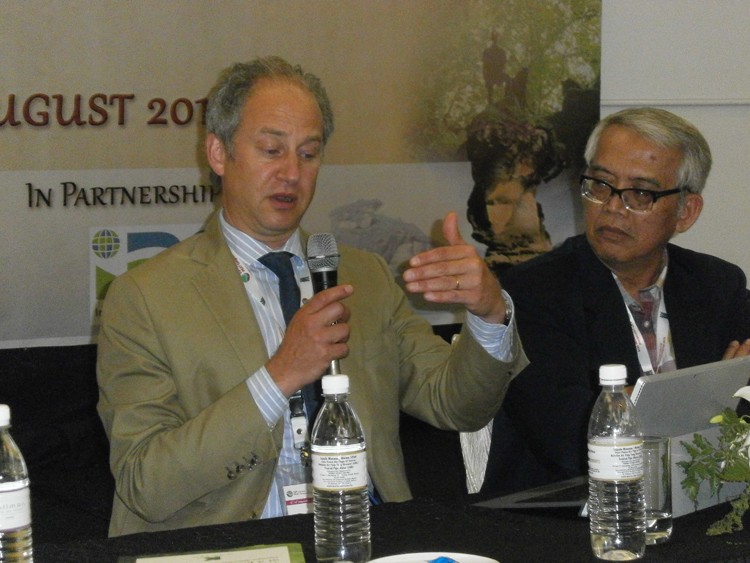Popular Reads
Top Results
Can't find what you're looking for?
View all search resultsPopular Reads
Top Results
Can't find what you're looking for?
View all search resultsCongress may change views on cultivation of peatland: IPS
Change text size
Gift Premium Articles
to Anyone
 Moritz Bocking, a member of the International Peat Society’s (IPS) executive board, (left) speaks to journalists on the sidelines of the International Peat Congress in Kuching, Sarawak, Malaysia on Friday, while Supiandi Sabiham, an expert from the Bogor Institute of Agriculture (IPB), looks on.
(JP/Bambang Nurbianto)
Moritz Bocking, a member of the International Peat Society’s (IPS) executive board, (left) speaks to journalists on the sidelines of the International Peat Congress in Kuching, Sarawak, Malaysia on Friday, while Supiandi Sabiham, an expert from the Bogor Institute of Agriculture (IPB), looks on.
(JP/Bambang Nurbianto)
T
he International Peat Society (IPS) has said that the 15th International Peat Congress in Kuching, Sarawak, Malaysia at which many results of new research were presented, may change the perception of environmentalists about the negative impact of cultivation on peatland areas.
A member of the IPS executive board Moritz Bocking said much of the new research showed that the agricultural development of peatland areas, such as by oil palm plantations, did not necessarily have a negative impact on the environment.
“We hope that more scientists from this region will be more active in conducting research on this issue. We will have a roundtable with NGOs. The IPS will arrange it,” Bocking told a press conference on the sidelines of the congress on Thursday.
Environmental activists have long criticized the development of oil palm plantations in peatland areas, arguing that it negatively affects the environment causing land subsidence and the significant release of carbon dioxide, which contributes to global warning.
But palm oil companies argue that such claims are only made to prevent the development of palm oil, which is tough a competitor to other oils like soya bean and sunflower oil that are developed in the US and European countries.
In response to the environmentalists’ view, Basuki Sumawinata, an expert on land science from the Bogor Institute of Agriculture (IPB), said experience of Sarawak oil palm plantations in peatland areas where the peatland was compacted before being planted showed that land subsidence did not happen.
“At the same time the fear of significant carbon release during the cultivation process on the peatland is not proven because the peatland remains intact. Meanwhile, the oil palm trees even help to absorb CO2 from the air,” Busuki said.
The three-day peat congress attended by nearly 1,000 participants from 30 countries closed on Thursday. (bbn)









